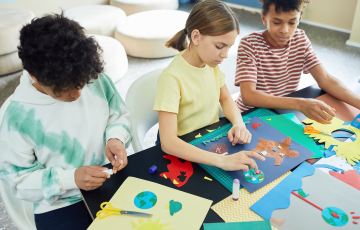Tips for supporting your teen:
- encourage your teen to maintain healthy eating habits and an active lifestyle
- talk to your teen about how she can balance independence and risk-taking with personal safety
- honest, open communication is the key to helping your teen make informed decisions about smoking, drugs and alcohol
- helping your teen build self-esteem through competence, good decision-making skills, and emotional resilience is the best way to prevent emotional, physical, and sexual abuse.
Services for youth
Island Health offers a variety of services for youth, including:
Shapedown BC Virtual Program
- Helps children between the ages of six and 17 and their families achieve healthy lifestyles. Available in Ladysmith, Nanaimo, Parksville and Qualicum (referral required).
Youth and Family Substance Use Services
Active Living
Some teens will have a keen interest in sports. For them, active living is already part of their everyday life. Other teens will need extra encouragement to make room for at least 30 minutes of physical activity in their days.
There are hundreds of ways your teen can make her life more active. Organized sports like yoga, curling, synchronized swimming, or karate might inspire them. Hiking, sailing, tai chi, water polo, breakdancing, scuba diving, skateboarding. Make a list and help your teen find an activity they like.
- make active living part of your family life. Walk or ride bikes instead of driving or taking the bus
- encourage your teenager to limit the amount of time they spend watching TV, playing video games, or using the computer
- model active living in your own life
Active Living Programs for Families
City of Victoria L.I.F.E Program
The L.I.F.E. Program provides a combination of annual credit and program savings to eligible low-income individuals and families to use towards recreational programs and services in all City recreational facilities and ten of our jointly operated centres.
Bring your completed application form to the Crystal Pool and Fitness Centre at 2275 Quadra Street, Victoria.
Please note: This is only available to City of Victoria citizens. Visit the City of Victoria website for more details, the application form and guidelines.
Boys and Girls Clubs provide low-cost activities for teens:
Nutrition
Not since infancy has your child experienced such rapid growth. Helping them maintain a healthy diet may be difficult but it is essential.
- encourage your teen to eat breakfast and make healthy choices while she is on her own throughout the day
- keeping up meal routines, despite busy schedules, is a good way to get healthy food into your teen, and it will give you a chance to spend time together and talk
- teens living with a sense of immortality will respond when you focus on the immediate benefits of good diet (increased energy, improved athletic ability, good skin)
- watch for signs of eating disorders: starving, binging and purging, overeating, excessive working out, diet pills, steroid use
- model healthy eating habits and a positive self image.
If your teen wants to make radical changes to his diet, such as becoming a vegetarian or entering a sport training diet, make sure he gets advice from a dietitian.
Preventing Abuse
As they grow older, teenagers must take on more responsibility for their safety. This includes avoiding abusive situations and relationships. It is a good idea to start teaching your child street-proofing techniques while they are young and to continue these with your teenager.
Some of the ways to teach your teen how to prevent abuse will remain as they were when your child was younger. Below are some new messages to share with your child.
- bullying between teenagers is more likely to include serious aggressive and violent behaviour
- talk with your teen about conflict resolution strategies
- continue teaching your teen how to deal safely with strangers
- talk about the motives of both adult and teen strangers
- encourage your teen to think critically about situations before getting involved with strangers - teach them to ask, “What does this person want from me? Do they have my best interests in mind?”
- teenagers are trying out new relationships and ways of relating to peers
- discuss the qualities of healthy friendships and romantic relationships
- help your teen identify signs of unhealthy or abusive relationships
Safety
By the time your child is a teenager, she will need to be responsible for her own safety in many different situations. It can be a challenge to convince teenagers that safety is important.
They are pushing boundaries, stretching their independence, and taking on new, sometimes frightening, endeavours – all with the aim of proving to themselves they can become an adult. The trick is to help them balance independence and risk-taking behaviour with a sense of personal responsibility for their safety.
- Risk-taking is a normal part of being a teenager
- talk to your teen about healthy and wise ways he can take risks – through activities like sports, creative works, travel, and activism
- teach your teen to be aware of his environment and how to assess risk
- encourage your teens to wear proper protective gear while they do sports
- helmets for sports like biking, skateboarding, and rollerblading
- padding,cups and mouth guards for sports like hockey, softball, and lacrosse
- when they try out new sports, enroll them in lessons with qualified trainers
- to continue to keep your child safe from preventable diseases, they should receive an immunization booster shot between the ages of 14 and 16 - this may be arranged through your child’s school or by calling your public health unit
- pressure from friends can lead your teen into dangerous situations
- teach them that they have choices, give them the skills to deal with peer pressure, and let them know they can always call you for help if they have gotten into trouble
Stay involved in your teen’s life. Go to sporting or performing events. Get to know their friends. Talk to your teen every day.
DID YOU KNOW?
One in five new drivers will be involved in a crash within the first two years of driving. Car crashes are the number one killer of youth aged 13 to 25 in B.C.
Source: ICBC
Get more information from ICBC on how to keep your teen safe behind the wheel or as a passenger.



